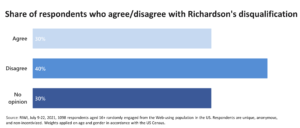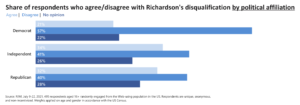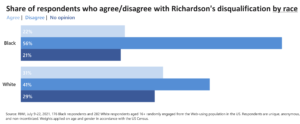By: Tianshuo Yang and Rikki H. Sargent
American track-star Sha’Carri Richardson, who is currently ranked 6th in the world for the 100m race and who qualified for the Tokyo Olympics, will not compete in the Olympic games. In the aftermath of a positive marijuana test, Richardson was suspended from the sport, making her ineligible to compete in the 100m sprint. Although Richardson’s 30-day suspension will lift before the Olympic 4x100m relay, officials decided to not name her on the relay team. Richardson will not run in the Tokyo Olympics.
According to news and popular media, Richardson’s disqualification from the Tokyo Olympics caused “sharp criticism” and “widespread outrage.” A petition even circulated calling on the USADA and WADA to remove Richardson’s penalty and update rules and regulations surrounding marijuana/cannabis use.
To our knowledge, however, no one has investigated the extent to which this outrage is representative of attitudes among the US general population. Is outrage as widespread as it seems? How does the general public feel about regulations that prohibit athletes from marijuana/cannabis use? Is public sentiment more supportive of the use of marijuana as legalization continues to expand in the states?
We sought to fill this data gap. Using RIWI’s technology, we surveyed a random sample of almost 2,000 Americans to gauge their opinion on the topic. Respondents reported whether they had heard about Richardson’s disqualification from the Tokyo Olympics, and if so, whether they agreed, disagreed, or had no opinion on the matter. Respondents were then asked whether athletes should or should not be allowed to use cannabis/marjuana and still compete, as well as whether cannabis/marjiuana acts as a performance enhancer. A subset of respondents were also asked to indicate their political affiliation and racial identification. To estimate national opinion, we applied weights on gender and age in accordance with the US Census.
Fifty-seven percent of respondents had heard about Richardson’s disqualification, and among these individuals there was vast disagreement in opinion (see figure below). These trends do not reflect the “widespread outrage” reported by many news and popular media outlets, but rather paint a much more complex picture.

Perhaps unsurprising considering attitudes toward marijuana legalization differ across party lines, agreement with Richardson’s disqualification also differs by political affiliation. The largest proportion of Democrats disagree with the disqualification, whereas agreement among Republicans and Independents is more mixed.

As it has been argued that Richardson’s disqualification is grounded in racism, it is also unsurprising to see that agreement with the disqualification differs by race. Respondents who identify as Black largely disagree with the disqualification, whereas agreement among respondents who identify as White is fairly mixed.

Across all respondents, opinion is split almost equally on whether athletes should be able to use cannabis/marijuana and still compete. Moreover, one of every three respondents believe that cannabis/marijuana use can enhance athletic performance, even though researchers have shown that this is not the case.
Overall, these data refute the view that outrage is widespread over Sha’Carri Richardson’s Olympic disqualification. Public response to Richardson’s disqualification is less clear-cut and one-sided than it may appear, the public is split on whether cannabis/marijuana use should be allowed among athletes, and a third of the population believes that cannabis/marijuana will enhance athletic performance. Moving forward, those reporting on situations like this may want to be more careful in assuming widespread outrage, and instead more closely evaluate true public sentiment.
A Note on RIWI Methodology
We used RIWI’s Random Domain Intercept Technology to hear from a random cohort of the US Web-using population. RIWI collects data using patented, machine-learning technology, and reaches in the broadest possible set of potential survey respondents. Any US Web-user could be randomly exposed to a RIWI survey. Unlike typical surveys, RIWI does not draw on habitual, incentivized survey respondents. RIWI surveys are anonymous, continuous, and do not collect personally identifiable information. RIWI collects information in 229 countries and territories and in over 80 languages.
Image Credit: Matt Lee licensed under Unsplash